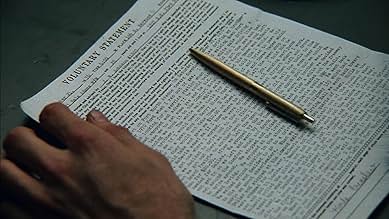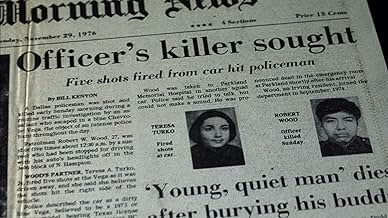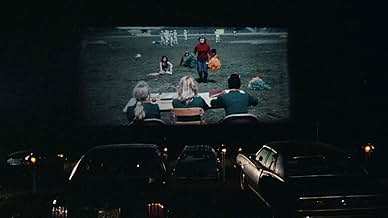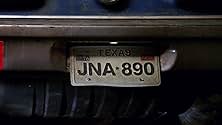IMDb रेटिंग
7.9/10
27 हज़ार
आपकी रेटिंग
अपनी भाषा में प्लॉट जोड़ेंA film that successfully argued that a man was wrongly convicted for murder by a corrupt justice system in Dallas County, Texas.A film that successfully argued that a man was wrongly convicted for murder by a corrupt justice system in Dallas County, Texas.A film that successfully argued that a man was wrongly convicted for murder by a corrupt justice system in Dallas County, Texas.
- पुरस्कार
- 12 जीत और कुल 5 नामांकन
फ़ीचर्ड समीक्षाएं
Having seen two other Errol Morris documentaries, I expected that there would be a Philip Glass soundtrack, some flashy camera work, and perhaps some reenactments during 'The Thin Blue Line'. I have long struggled with my opinions on Morris' work, mainly because I am more of a purist when it comes to documentaries. I want to see footage, photographs, interviews, etc. that are going to back up a strong story, not a lot of camera angles, stark white backgrounds, and a post-modernist score.
'The Thin Blue Line' had the latter presentation, so I immediately was slightly turned off until the subject of the film was presented. The location is Dallas, and it is the 1970's. Late one night, a squad car pulls over a car that does not have its lights on, but as soon as the policeman reaches the driver's side door, he is shot several times and murdered. The car pulls away before the policeman's partner is able to ascertain the license plate number or even the exact make and model of the vehicle. What follows is a veritable witch hunt for the killer (or killers) that ends with one man in jail who is professing his innocence, and another man, a career criminal who gets away veritably scot-free. Through various interviews with the players involved; detectives, alleged eye-witnesses, the accused themselves, Morris seeks to find out the truth in a case that comes down to a 'he-said/he-said' situation.
'The Thin Blue Line' is expert film-making in the investigative sense. Morris does his job in presenting as many facts as possible. The case finally came to a head a couple of years after the film was finished, but it is documented as being instrumental in the reexamination of the facts. I still don't necessarily care for Morris' style, but it cannot be argued that 'The Thin Blue Line' is an excellent documentary, and that he definitely has an eye for picking very compelling subjects.
--Shelly
'The Thin Blue Line' had the latter presentation, so I immediately was slightly turned off until the subject of the film was presented. The location is Dallas, and it is the 1970's. Late one night, a squad car pulls over a car that does not have its lights on, but as soon as the policeman reaches the driver's side door, he is shot several times and murdered. The car pulls away before the policeman's partner is able to ascertain the license plate number or even the exact make and model of the vehicle. What follows is a veritable witch hunt for the killer (or killers) that ends with one man in jail who is professing his innocence, and another man, a career criminal who gets away veritably scot-free. Through various interviews with the players involved; detectives, alleged eye-witnesses, the accused themselves, Morris seeks to find out the truth in a case that comes down to a 'he-said/he-said' situation.
'The Thin Blue Line' is expert film-making in the investigative sense. Morris does his job in presenting as many facts as possible. The case finally came to a head a couple of years after the film was finished, but it is documented as being instrumental in the reexamination of the facts. I still don't necessarily care for Morris' style, but it cannot be argued that 'The Thin Blue Line' is an excellent documentary, and that he definitely has an eye for picking very compelling subjects.
--Shelly
The last few years have been a golden age for documentaries. For better or worse, Michael Moore and his undeniable ability for manipulating the cinematic medium have brought this endangered genre into theaters and living rooms across the country. Most of today's casual moviegoers are relatively new to the non-fiction feature. In the case of director Errol Morris' The Thin Blue Line (1988), one film not only managed to free an innocent man from a lifetime in prison, but it also elicited a confession from the guilty party. After collecting dust on video shelves for over fifteen years, this groundbreaking documentary has finally arrived on DVD.
Unless you're a devout cinephile or a video store clerk, you have probably never heard much about Errol Morris. As a member of the former category, I've been a fan of his since first renting The Thin Blue Line more than a decade ago. As I popped in that dusty VHS cassette and sat back, I relished what many critics and documentary purists had been hotly debating: Morris was taking the genre to exciting new places, whether people liked it or not.
As with all successful movies, a good doc needs a good story. In 1976, Dallas County police officer Robert Wood and his partner were patrolling their district late one night. The two pulled a blue car over to the side of the road, most likely to warn the driver of a busted taillight. Moments later Officer Wood was lying on the ground, fatally wounded by a series of gunshots. His partner quickly ran to his aid, but was unable to accurately retain and recall certain information about the killer's vehicle. Was it a Vega or a Comet? Did the driver have bushy hair or a fur-lined collar? These and many other questions emerged during the rushed investigation to bring the mysterious cop-killer to justice.
The film itself opens more than ten years after the murder took place. Randall Adams, an oddly charismatic good ol' boy sits before the camera, revealing what happened that unfortunate evening in late 1976. He admits to having shared a ride with a young kid named David Harris. The two apparently attended a drive-in double feature, where they both drank beer and smoked marijuana. Shortly thereafter, Adams claims to have been dropped off at his motel for the evening. Meanwhile, Morris shows us the aforementioned David Harris, now in his mid-20s, talking cryptically about that night's events. This real-life Rashomon confronts viewers with several versions of "the truth." It's unclear whether Morris instinctively knew the truth was still out there when he decided to pursue this project, but his previous experience as a private investigator seems to have paid off as we witness his off- camera interrogation of these two men.
Adams, responsible or not, was determined guilty by the courts and sentenced to death. Despite having a police record as long as his shadow, David Harris became the primary witness against Adams in the case. His testimony alone might not have hung Adams, but at the last minute a trio of eyewitnesses to the crime emerged to corroborate his story. In the world of Errol Morris, people are a truly strange lot, and his greatest technique is to simply let his subjects talk and talk until their inherent weirdness becomes painfully evident. Such is the case with the three last-minute witnesses in the Adams case. The more we hear them speak, the greater that uneasy feeling in our stomach and chest becomes. We are bearing witness to a catastrophic miscarriage of justice.
Morris employs a bottomless bag of tricks in this landmark film. While much of the film does rely on the presence of talking heads, he adds other elements to the mix, such as old movie footage, a haunting score by renowned composer Philip Glass, and the granddaddy of documentary no-no's: dramatic re-enactments. The latter tends to be the most challenged aspect of The Thin Blue Line, but Morris uses it fairly and wisely. He tells this twisted tale in ways few people could. A shot of a swaying timepiece or a concession stand popcorn machine suddenly amount to much more than what we're simply seeing on the screen. All of these pieces are being put together, little by little, in the hopes that by the end we will see the bigger picture.
When this movie was released in 1988, it was marketed as a non-fiction film, because the word "documentary" was thought to scare off ticket-buyers. The studio's attempts to pass it off as a murder mystery failed, but the movie made a minor splash once it hit video. It picked up plenty of awards from festivals and critics groups, but the Oscars didn't even bother nominating it. In fact, the Academy didn't so much as nod in Morris' direction until early 2004, when they nominated The Fog of War, his powerful, relevant look at former U.S. Secretary of Defense, Robert McNamara. That film and Morris' two previous masterpieces, Mr. Death and Fast, Cheap & Out of Control have been available on DVD for some time. His first three films, Gates of Heaven, Vernon, Florida, and The Thin Blue Line, were recently made available either individually or in a 3-disc box set. All six of these films are unique, intriguing portals into Mr. Morris' strange universe, which is not so distant from our own. If it's dramatic situations, reality TV, or simply a great movie that you want, look no further than The Thin Blue Line. As one of the greatest documentaries of our time, it is all these things and so much more.
Rating: A
Unless you're a devout cinephile or a video store clerk, you have probably never heard much about Errol Morris. As a member of the former category, I've been a fan of his since first renting The Thin Blue Line more than a decade ago. As I popped in that dusty VHS cassette and sat back, I relished what many critics and documentary purists had been hotly debating: Morris was taking the genre to exciting new places, whether people liked it or not.
As with all successful movies, a good doc needs a good story. In 1976, Dallas County police officer Robert Wood and his partner were patrolling their district late one night. The two pulled a blue car over to the side of the road, most likely to warn the driver of a busted taillight. Moments later Officer Wood was lying on the ground, fatally wounded by a series of gunshots. His partner quickly ran to his aid, but was unable to accurately retain and recall certain information about the killer's vehicle. Was it a Vega or a Comet? Did the driver have bushy hair or a fur-lined collar? These and many other questions emerged during the rushed investigation to bring the mysterious cop-killer to justice.
The film itself opens more than ten years after the murder took place. Randall Adams, an oddly charismatic good ol' boy sits before the camera, revealing what happened that unfortunate evening in late 1976. He admits to having shared a ride with a young kid named David Harris. The two apparently attended a drive-in double feature, where they both drank beer and smoked marijuana. Shortly thereafter, Adams claims to have been dropped off at his motel for the evening. Meanwhile, Morris shows us the aforementioned David Harris, now in his mid-20s, talking cryptically about that night's events. This real-life Rashomon confronts viewers with several versions of "the truth." It's unclear whether Morris instinctively knew the truth was still out there when he decided to pursue this project, but his previous experience as a private investigator seems to have paid off as we witness his off- camera interrogation of these two men.
Adams, responsible or not, was determined guilty by the courts and sentenced to death. Despite having a police record as long as his shadow, David Harris became the primary witness against Adams in the case. His testimony alone might not have hung Adams, but at the last minute a trio of eyewitnesses to the crime emerged to corroborate his story. In the world of Errol Morris, people are a truly strange lot, and his greatest technique is to simply let his subjects talk and talk until their inherent weirdness becomes painfully evident. Such is the case with the three last-minute witnesses in the Adams case. The more we hear them speak, the greater that uneasy feeling in our stomach and chest becomes. We are bearing witness to a catastrophic miscarriage of justice.
Morris employs a bottomless bag of tricks in this landmark film. While much of the film does rely on the presence of talking heads, he adds other elements to the mix, such as old movie footage, a haunting score by renowned composer Philip Glass, and the granddaddy of documentary no-no's: dramatic re-enactments. The latter tends to be the most challenged aspect of The Thin Blue Line, but Morris uses it fairly and wisely. He tells this twisted tale in ways few people could. A shot of a swaying timepiece or a concession stand popcorn machine suddenly amount to much more than what we're simply seeing on the screen. All of these pieces are being put together, little by little, in the hopes that by the end we will see the bigger picture.
When this movie was released in 1988, it was marketed as a non-fiction film, because the word "documentary" was thought to scare off ticket-buyers. The studio's attempts to pass it off as a murder mystery failed, but the movie made a minor splash once it hit video. It picked up plenty of awards from festivals and critics groups, but the Oscars didn't even bother nominating it. In fact, the Academy didn't so much as nod in Morris' direction until early 2004, when they nominated The Fog of War, his powerful, relevant look at former U.S. Secretary of Defense, Robert McNamara. That film and Morris' two previous masterpieces, Mr. Death and Fast, Cheap & Out of Control have been available on DVD for some time. His first three films, Gates of Heaven, Vernon, Florida, and The Thin Blue Line, were recently made available either individually or in a 3-disc box set. All six of these films are unique, intriguing portals into Mr. Morris' strange universe, which is not so distant from our own. If it's dramatic situations, reality TV, or simply a great movie that you want, look no further than The Thin Blue Line. As one of the greatest documentaries of our time, it is all these things and so much more.
Rating: A
I first saw this film not long after its initial release some 20 years ago and images and scenes from it have stayed with me ever since, so that it was with considerable anticipation that I re-watched it again recently. Down the years I can still recall Randall Adams drawling in his unforgettable voice "The kid scares me", the ever-revolving red light on the cop-car and most of all Philip Glass' wonderful, hypnotic music. The depiction of the fateful night of the cold-blooded murder of the policeman is shown from, almost literally, every possible angle, conveyed in a highly stylised way with almost every speculated remembrance of the doubtful list of every dubious (and are they ever dubious!) witness played out on the screen, the effect, in so doing, to completely explode their fantasist recollections, as was no doubt the director's aim. The reconstructions are set alongside filmed interviews of most of the main protagonists (with the main exception of the second cop in the car who witnessed the killing). As you watch these, the centrepiece clearly becomes the contrasting testimony of the almost-certain murderer David Harris with the wronged Randall Adams, the first coming across from the start as duplicitous and uncaring, the latter as bemused but reasoning. I was particularly taken with the erudition of Adams, who suppresses his inner rage with admirable restraint as he points the viewer time and again back to the evidence. As an indictment of the American criminal justice system, it hits home hard; it appears that investigation standards head for the hills especially when the law has a cop-killer to nail. Thankfully the miscarriage of justice was eventually resolved although it makes you grateful for the coincidence which led director Morris to change the subject course of his original project to instead highlight Adams' case culminating in his release soon after the film was first shown. The film however is more than a crusading documentary and there is much for students and admirers of the film-makers art to enjoy. Unforgettable, really, almost haunting, and proof if needed that truth really is stranger than fiction.
10mprins
Along with 1996's Paradise Lost, The Thin Blue Line should be mandatory viewing for those who believe that the criminal justice system eventually convicts only the guilty. It is a stark and shocking look at one man behind bars and the truckloads of evidence that point toward his innocence. Documentarian Errol Morris indirectly argues that, at the very least, this evidence should have presented a "reasonable doubt" to the jury, and near the end of the movie, the audience has little choice but to accept his unbelievable findings. And the film ends with a single scene of just a tape recorder and voices that should be recognized as one of the most powerful endings to a movie, ever. A documentary masterpiece.
10faraaj-1
I grew up in a society that strongly believes in the death penalty - a religion injunction based on the Islamic code of justice. I remember being told a story (don't know if its true) of how the US President visited Saudi Arabia and on the last day of his visit he was treated to some public be-headings. When he questioned the morality of it, his host informed him that the handful of criminals punished represented the entirety of the criminal population for the past one year. The moral being that harsh punishments prevent crimes and caring too much about the aggressor leads to high crime rates. I personally lost faith in the prison system many years ago after reading about the Milgram and Stanford Prison Experiment findings. A harrowing Australian movie, Ghosts of the Civil Dead made me detest the prison system even more. In recent years Abu Ghraib and Guantanamo have left a bad taste in the mouth. So, is the answer really the death penalty and other physical measures that can't be reversed? After seeing The Thin Blue Line I just don't know. This film has really affected me.
An innocent hitch-hiker, and from what I saw in the documentary a decent man, is caught at the wrong time in the wrong place - a former sundown town called Vidor, Dallas County. He is implicated in the murder of a cop and is obviously innocent of the crime. The entire legal system of Vidor is bent to prosecute him. The reason: the real killer is a 16-year old and there's no benefit in finding him guilty because he can't be given the death penalty. Randall Adams, in his 20's, can and must be punished because he's a stranger to these small-minded bigots and someone must pay! Shocking that people can think that way. It makes The Ox-Bow Incident and issues it raised 70 years ago valid even today. This was no more than a judicial lynching.
Fortunately, in this case Randall Adams' case was reopened and he was acquitted and released, in large measure due to this documentary and the scandal it caused. The story is exceedingly well told and the end with the tape recorded last interview with David Harris is chilling. I can't say that after watching this I still have a clear opinion of what punishment should fit a crime, but it has certainly made me question the validity of the mentality present in so many Muslim countries. Who is to say there can be no similar travesty of justice there?
An innocent hitch-hiker, and from what I saw in the documentary a decent man, is caught at the wrong time in the wrong place - a former sundown town called Vidor, Dallas County. He is implicated in the murder of a cop and is obviously innocent of the crime. The entire legal system of Vidor is bent to prosecute him. The reason: the real killer is a 16-year old and there's no benefit in finding him guilty because he can't be given the death penalty. Randall Adams, in his 20's, can and must be punished because he's a stranger to these small-minded bigots and someone must pay! Shocking that people can think that way. It makes The Ox-Bow Incident and issues it raised 70 years ago valid even today. This was no more than a judicial lynching.
Fortunately, in this case Randall Adams' case was reopened and he was acquitted and released, in large measure due to this documentary and the scandal it caused. The story is exceedingly well told and the end with the tape recorded last interview with David Harris is chilling. I can't say that after watching this I still have a clear opinion of what punishment should fit a crime, but it has certainly made me question the validity of the mentality present in so many Muslim countries. Who is to say there can be no similar travesty of justice there?
क्या आपको पता है
- ट्रिवियाErrol Morris spent 2-1/2 years tracking down the various players in the Randall Adams case and convincing them to appear in the film.
- गूफ़David Harris talks about his older brother drowning at the age of four in 1963. He says it occurred "right after President Kennedy was assassinated I believe. Sometime right after that. During the summer". However Kennedy was killed in the third week of November, well after summer.
- भाव
Melvyn Carson Bruder: Prosecutors in Dallas have said for years - any prosecutor can convict a guilty man. It takes a great prosecutor to convict an innocent man.
- क्रेज़ी क्रेडिटDrawings from the Bender Visual Motor Gestalt Test © 1946, American Orthopsychiatric Association Inc. and Lauretta Bender, M.D.
टॉप पसंद
रेटिंग देने के लिए साइन-इन करें और वैयक्तिकृत सुझावों के लिए वॉचलिस्ट करें
- How long is The Thin Blue Line?Alexa द्वारा संचालित
विवरण
बॉक्स ऑफ़िस
- US और कनाडा में सकल
- $12,09,846
- US और कनाडा में पहले सप्ताह में कुल कमाई
- $17,814
- 28 अग॰ 1988
- दुनिया भर में सकल
- $12,09,846
- चलने की अवधि1 घंटा 41 मिनट
- रंग
- ध्वनि मिश्रण
- पक्ष अनुपात
- 1.85 : 1
इस पेज में योगदान दें
किसी बदलाव का सुझाव दें या अनुपलब्ध कॉन्टेंट जोड़ें






































